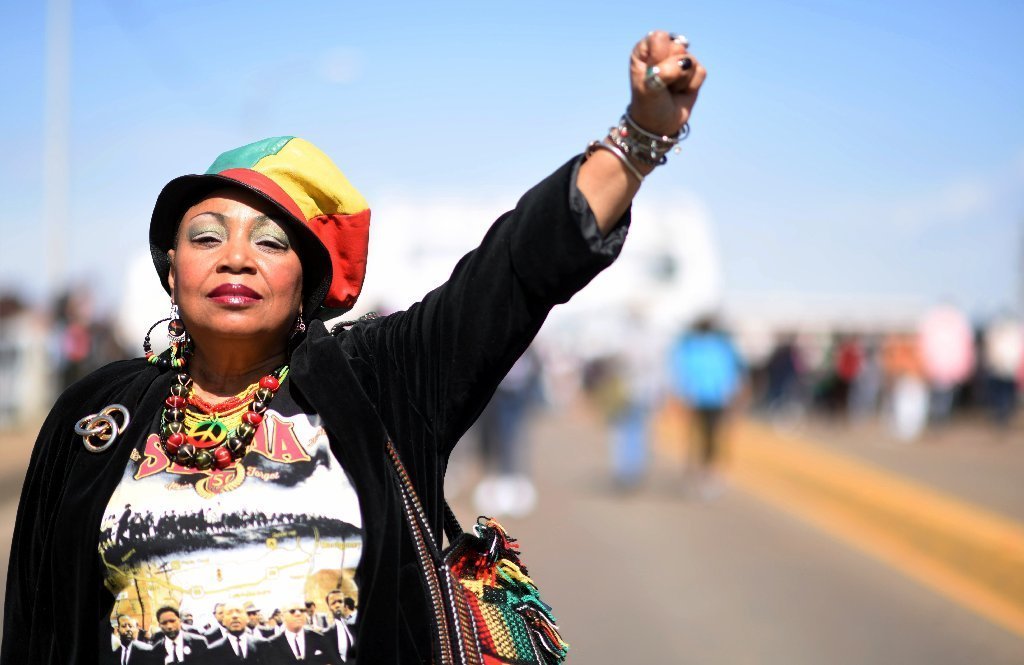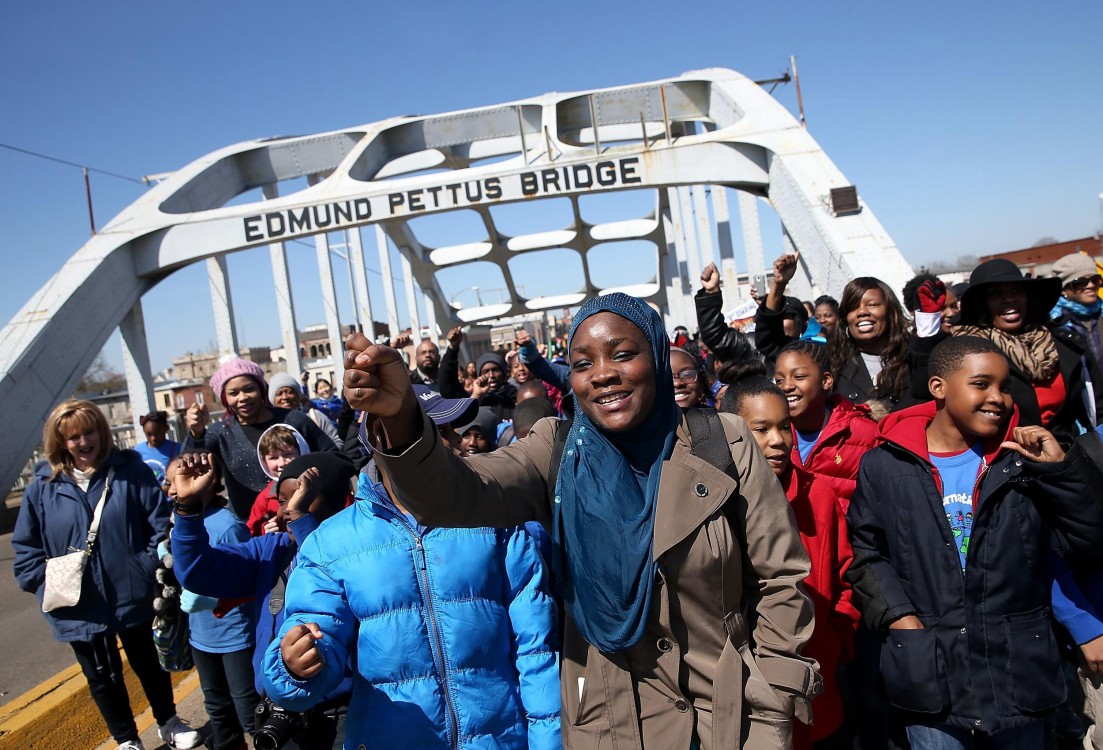U.S. Attorney General Eric Holder said Sunday that protections gained under the Voting Rights Act of 1965 are "under siege" today, even as tens of thousands of people converged on Selma, Alabama, for a weekend commemorating the 50th anniversary of “Bloody Sunday” — a brutal police crackdown on a march aimed at ending voting discrimination.
“Fair and free access to the franchise is still, in some areas, under siege,” Holder said in a speech at Selma's Brown Chapel AME Church. “Shortly after the historic election of President Obama in 2008, numerous states and jurisdictions attempted to impose rules and laws that had the effect of restricting Americans’ opportunities to vote — particularly, and disproportionately, communities of color.”
Holder's comments came ahead of a traditional march across the Edmund Pettus Bridge. The bridge — named after a Confederate general and Ku Klux Klan leader — was the site of a violent police crackdown on peaceful protesters who were taking part in a voting rights march from Selma to Montgomery on March 7, 1965.
Martin Luther King joined protesters in their second attempt to cross the bridge days later, but it wasn't until March 21, 1965, that civil rights protesters were able to make it across and continue all the way to the state capital.
The city of Selma paid homage this weekend to late President Lyndon Johnson, who signed the 1965 Voting Rights Act just months after the marches, according to local newspaper AL.com. Hundreds gave Johnson a standing ovation, chanting “L.B.J., L.B.J., L.B.J.”
But Holder said in Selma on Sunday that the Voting Rights Act’s hard-won protections for African-Americans are under threat. The attorney general said the Civil Rights Movement's work is not done as long as racial barriers remain at U.S. voting booths.
He said the Department of Justice (DOJ) would fight the 2013 Supreme Court decision that undermined Section 5 of the Act — taking away vital pre-clearance protections that had achieved a more equal voting climate.
“Let me be clear,” Holder said. “While the Court’s decision removed one of the Justice Department’s most effective tools, we have used the remaining provisions of the Voting Rights Act to fight back against voting restrictions in states throughout the country — and won.”
In Texas, Holder said, the DOJ has sought to block as discriminatory a strict photo identification law and two statewide redistricting plans. The agency sued in North Carolina to enjoin a statute that eliminated same-day registration during early voting. Critics say these rules disproportionately target African-Americans.
“The Justice Department is also working hard outside the courtroom,” Holder said. “I have urged state legislatures to lift restrictions that currently disenfranchise millions of citizens convicted of felonies who have served their sentences in order to help them rejoin their civil communities and reclaim their futures.”
Though Holder will soon step down from his position, to be replaced by Loretta Lynch — who will be the first black woman to serve as the nation's top law enforcement official — he said he will not abandon his mission, and encouraged others to continue to struggle for equality.
“The times change, the issues seem different, but the solutions are timeless and tested: Question authority and the old ways,” Holder said. “Work. Struggle. Challenge entrenched power. Persevere. Overcome.”
U.S. Rep. John Lewis, (D-Ga.), who was severely injured during "Bloody Sunday" five decades ago, and the Rev. Al Sharpton were among other leaders joining thousands from all over the country in Selma on Sunday, AL.com reported.
President Barack Obama attended commemoration events in Selma on Saturday, leading a symbolic march across the bridge and giving a speech in which he called on Americans to carry forward the spirit of the Civil Rights movement.
"First and foremost, we have to recognize that one day’s commemoration, no matter how special, is not enough,” Obama said Saturday in front of the bridge. “If Selma taught us anything, it’s that our work is never done — the American experiment in self-government gives work and purpose to each generation."
A new generation of civil rights protesters was born last August, when unarmed black teenager Michael Brown was fatally shot by a white police officer in Ferguson, Missouri. Brown's relatives took part in Selma's commemoration events this weekend.
A photo posted on Twitter showed a group of people who the poster said included Brown’s mother, Lesley McSpadden, emerging from a local church with their hands in the air. Witnesses had said that Brown had his hands up when he was killed.
Obama has admitted that Brown’s death proved there is more work to be done in terms of achieving racial equality in America. But the president said that significant progress had been made since 1965, and that although Brown's killing was not unique, “it’s no longer endemic, or sanctioned by law and custom.”
3 WAYS TO SHOW YOUR SUPPORT
- Log in to post comments













